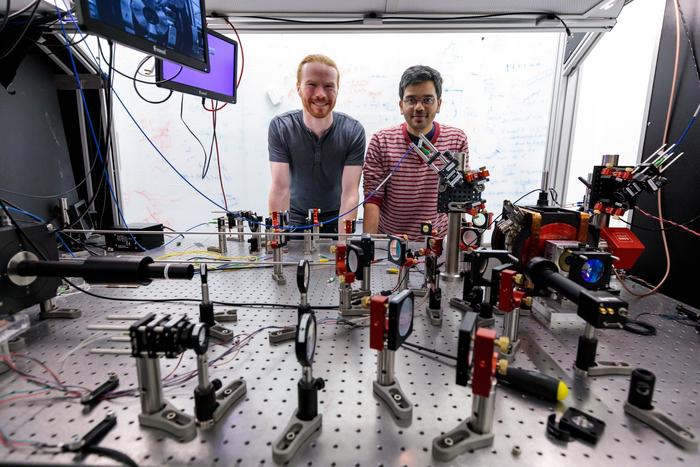Insider Brief
- The National Science Foundation (NSF) presented its quantum information technology research to Congress recently.
- According to a NextGov report, the event is a way to showcase the importance of federal funding for emerging technologies.
- NSF Director Sethuraman Panchanathan said these tangible displays of technology bridge the gap between scientific theory and real-world applications.
After establishing a lead in funding United States’ quantum and deep tech initiatives, lawmakers seem to be pulling back. This week, members of the quantum community — including the National Science Foundation and The Quantum Economic Development Consortium (QED-C) — tried to put quantum back on the national agenda.
The NSF presented examples of quantum information technology research to Congress, in a showcase event that might be seen as a way to stress the importance of federal funding for emerging technologies, according to a story in NextGov. The event — which fixed a spotlight on several ongoing projects from across the nation that could shape the future of technology and global competition — shows the agency’s is continuing the effort to secure this critical financial support in the face of budget cuts.
During this second NSF technology showcase–following a previous focus on Artificial Intelligence–lawmakers, including leaders from the Science and Technology Committee, were able to engage directly with the innovations funded by NSF grants, reported NextGov. NSF Director Sethuraman Panchanathan said these tangible displays of technology bridge the gap between scientific theory and real-world applications.
“The reason it’s important for having the showcases here, is this is…where policy gets made, investments in the future get made, and so it’s very important that we engage with our policy leaders and investors and ensure that we are demonstrating to them that the taxpayer dollars that we are investing in is producing the outcomes that they still desire,” said Panchanathan, as reported by NextGov.


The showcase seems timely, given recent financial constraints for NSF, which many consider one of the nation’s main drivers for quantum investigations and, by extension, a key supporter of the US quantum ecosystem.
The agency’s America’s Seed Fund has directly or indirectly supported quantum technology startups. The Quantum Insider Market Intelligence lists at least 13 startups that benefitted from these seed grants. Other NSF programs bolster the community in other ways, including basic science funding, which can lead to more practical deep tech applications.
The NSF’s budget for fiscal 2024 was set at $9.06 billion—$479 million less than the previous year and $2.29 billion below what President Joe Biden had requested.
Adding a broader perspective on the stakes involved, Barbara Snyder, president of the Association of American Universities, recently underscored the broader implications of funding cuts in a statement to Inside HigherEd: “Congressional failure to restore NSF’s budget jeopardizes our country’s future economic and national security,” she stated. Snyder highlighted the ripple effects of reduced funding: “America’s continued scientific leadership and global competitiveness are at risk here—including in crucial areas like AI [artificial intelligence], quantum computing, advanced manufacturing, climate change, and creating the STEM [science, technology, engineering, and math] workforce we need in order to continue as the world’s technological and scientific leader.”
At a time when a deep tech workforce development is needed, Snyder also said that the NSF’s inability to support research initiatives would have detrimental impact on the workforce, adding that people may be dissuaded from pursuing careers in critical scientific fields.
“Forcing NSF to make serious cuts also negatively impacts grant success for researchers interested in working on critical scientific advancements, further discouraging careers in STEM,” Snyder said, as reported by Inside HigherEd.
Lawmakers like Reps. Zoe Lofgren, D-Calif., Frank Lucas, R-Okla., and Haley Stevens, D-Mich., have expressed their support for increased NSF funding. They have also served as keen advocates for the passage of the National Quantum Reauthorization Act, which could substantially influence NSF’s efforts in quantum sciences. This act aims to enhance the infrastructure needed for cutting-edge research by establishing scholarships, fostering international collaborations, and promoting partnerships with the private sector for workforce development.
At the heart of these discussions is the broader implication of supporting advanced research areas, reports NextGov. As Lofgren noted during the event, updating and expanding access to modern scientific tools is crucial for accelerating scientific progress and maintaining a competitive edge globally.
Panchanathan also pointed out the interconnected nature of modern technologies such as quantum information science and technology (QIST), AI, biotech, and advanced manufacturing. Rather than supporting certain technologies and neglecting others, Panchanathan said that in this growing convergence of deep techs, smart investments could support all of these technologies that could serve as the foundation for future industries.
“We are investing in ideas that [do] not even have labels, like we invested in quantum several decades ago,” he told NextGov. “So we want that to flourish. At the same time, you want AI, quantum, biotech, advanced manufacturing, advanced wireless, all of these technologies to prosper…train people for the future industries. We want that to happen at the same time. These are not one versus the other.”




















